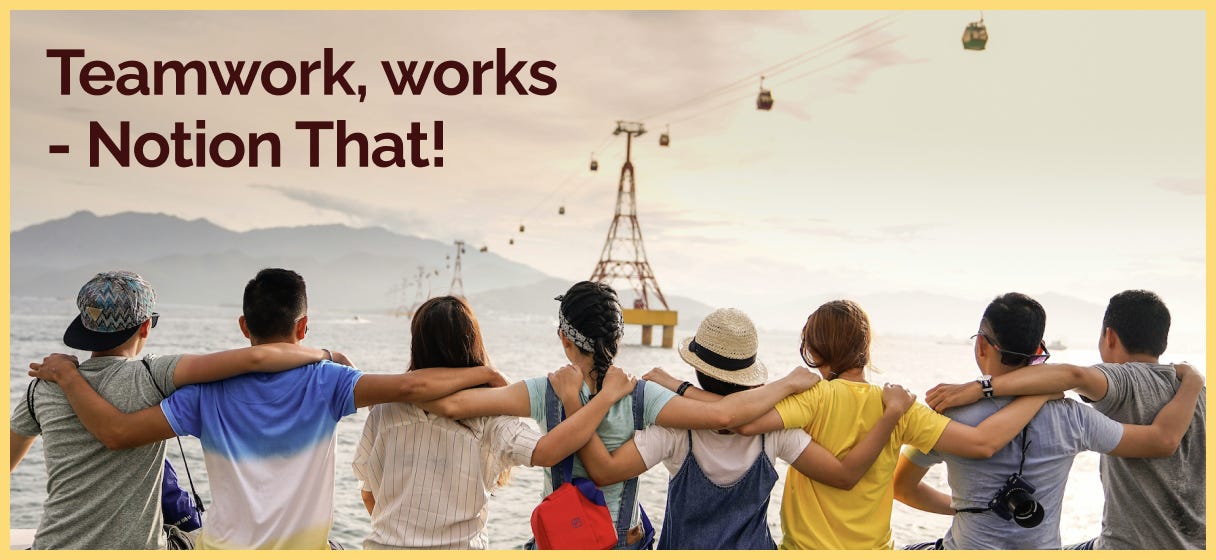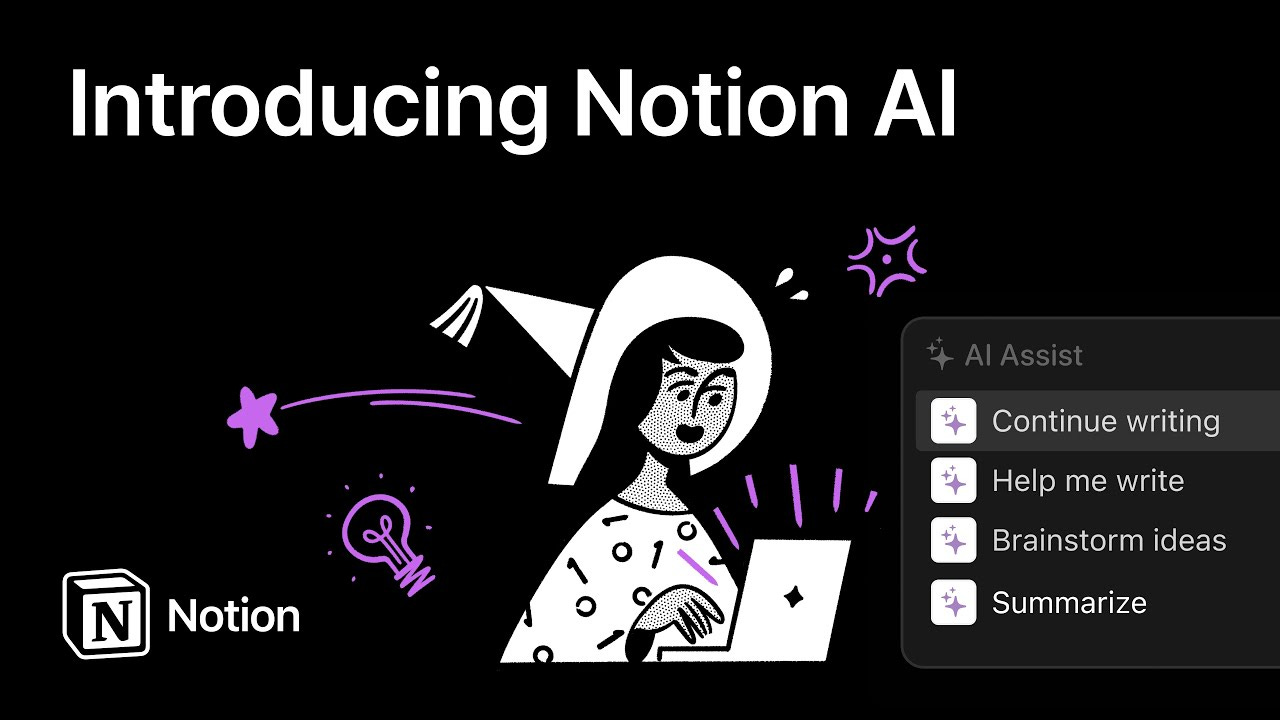Teamwork, works - Notion That!
Simplicity, Flexibility, andAccessibility in a fragmented App world!
Hey Everyone!
Have you ever wondered why we have so many different apps and tools for work? Like Dropbox, Google Docs, Slack, and many others? It all started a long time ago.
During the Industrial Revolution, when people worked in factories, they needed tools to help them manage everything. That's when typewriters, files, and file cabinets were invented. These were created to make work easier by keeping things organized.
Then, in the 1950s, giant-sized computers came into offices. At first, they were only good for doing math. But two decades later, some smart people had big ideas. They imagined computers could do much more than just crunch numbers. The size of the computers also started to reduce drastically. They dreamed of and created computers that could help us be more creative and smart.
But, even though technology advanced, our work tools stayed kind of the same. We still use lots of different apps to work on different tasks and have to juggle between them. That again goes back to hard work more than smart work.
That's where Notion comes in! It's a new kind of tool that tries to fix this problem. Notion brings together all the things you need for work into one place. It’s an all-in-one productivity tool that collaborates your workspaces. Whether it's making a to-do list, planning a project, or storing designs, you can do it all in Notion. And you can even customize it to fit how you like to work.
So, in this blog, we'll talk about how Notion was made, the problems it wants to solve, the challenges it faced on the way, and what it hopes to do in the future. Let's discover how team notion aims at making everyone a 'NOTIONAL'.
How it all began?
(From right: Akshay Kothari, Simon Last, Ivan Zhao)
Notion's journey began when Ivan Zhao, one of the founders, after reading a paper by Douglas Engelbart titled "Augmenting Human Intellect: A Conceptual Framework," felt inspired to create tools that would enhance creativity and innovation in the workplace.
In 2013, Ivan Zhao and Simon Last secured about $2 million in seed funding from angel investors, including support from family and friends. With this financial backing, they embarked on developing a no-code tool called Concept. Despite their efforts, Concept didn't gain traction, leading to financial strain by 2015.
“We focused too much on what we wanted to bring to the world, we needed to pay attention to what the world wanted from us.” - Ivan Zhao, Co-founder and CEO of Notion
In a bid to extend their runway, Ivan and Simon made a daring move. They let go of their young team of 4 and relocated from San Francisco to Kyoto, Japan, where they poured their hearts and souls into coding for up to 18 hours a day.
In March 2016, their perseverance paid off when they released the Notion 1.0. To attract users, they offered the product for free, with Ivan's mother even providing $150,000 to keep the company afloat during these early stages.
Soon after, they strategically listed Notion on the discovery platform Product Hunt and garnered attention from influential figures like Naval Ravikant, the founder of AngelList and one of Notion’s early investors, who shared the product on his Twitter handle with his vast following.
Notion always worked with a small team and Ivan was so invested in the company that he engaged directly with users and early adopters. This played a huge role in Notion’s growth. He met with startup founders and leveraged platforms like Y Combinator that helped attract early business adopters.
Notion's ascent was further propelled by the decline of Evernote, a competing note-taking software, which faced backlash over pricing changes. Notion seized this opportunity to emerge as a viable alternative.
In March 2018, the release of Notion 2.0, accompanied by Android and iOS apps, garnered praise from prominent publications like The Wall Street Journal, solidifying Notion's position as an indispensable productivity tool. So, with Notion 2.0, the organization found its product-market fit. Thus, with just a seed round funding, Notion reached the 1 million user mark. Currently, their user count is over 30 million.
This success attracted notable figures like Akshay Kothari, an early investor in Notion and the former owner of Pulse, a news aggregation app sold to LinkedIn for $90 million in 2013. He joined as Chief Operating Officer, and he was the 8th employee. Investor confidence in Notion soared, leading to significant funding rounds in July 2019 and later in 2020, valuing the company at an impressive $2 billion. By 2021 their valuation rose sharply due to remote work and their virality on TikTok and reached $10 billion.
“I’ve worked across just about every function: support, sales, marketing, customer success, people, legal and finance. Basically my job has been to spend 6-9 months getting any of these functions off the ground then to hire a very experienced person to run it from there. Essentially it’s a bizops job – I ramp up and get something going quickly, then hire someone to run it long-term.” - Akshay Kothari, COO, Notion
(Image Courtesy: notion)
Now headquartered in San Francisco, California, through determination, resilience, and a commitment to user-centric innovation, Notion has transitioned from its humble beginnings as a startup to a global leader in productivity software.
Before moving on to understanding how Notion acquired its first 1000 customers, I want to share a bit of information about the founders. The founders of Notion, Ivan Zhao and Simon Last, possess diverse backgrounds that have greatly contributed to the company's success. Ivan Zhao, the CEO, has harbored a passion for computer science since his early years in China. He not only acquired coding skills but also actively participated in programming competitions. Upon relocating to Vancouver, Canada, for high school, he pursued further education in cognitive science and art at the University of British Columbia.
During his time at university, Ivan, apart from regular studying, also began assisting his art student friends. Recognizing their need for effective online portfolio websites to showcase their work, Ivan utilized his programming skills to help them create visually appealing and functional platforms. Through these experiences, he identified a gap in the market for intuitive and accessible tools tailored to the needs of creative professionals.
Prior to venturing into the creation of Notion, Ivan Zhao began his entrepreneurial journey by joining a startup called Inkling, which focused on e-books. However, despite his initial excitement, Ivan found himself increasingly drawn to the concept of visually oriented programming. This fascination led him to realize the untapped potential in creating user-friendly tools for creative individuals
Driven by his passion for empowering users through technology, Ivan made the bold decision to depart from Inkling and pursue his vision of developing user-centric software solutions.
Notion’s Principle: To empower every person on the planet to use software exactly the way they want.
This pivotal moment marked the beginning of his journey towards co-founding Notion. He recruited Simon Last, who was still a student at the University of Maryland, College Park, as an intern. However, Simon and Ivan soon realized their shared dedication to creating innovative solutions, prompting Simon to leave college and join Ivan as a full-time co-founder.
Success with no marketing expenses
Notion, the handy productivity app used by millions today, didn't start out with a huge user base. In fact, they had to work hard to get their first 1000 users. Here's how they did it:
Starting Point: Ivan wanted to create a tool that could do a lot of different things all in one place. He made a simple version and shared it with his friends and family to see if they liked it.
First Public Release: “Notion 1.0” which was released in 2016 was just a basic app for taking notes and saving web pages, but people liked it because it was easy to use and customizable.
Spreading the Word: Notion didn't have a big advertising budget, so they relied on word-of-mouth and social media to get the word out. People who liked the app told their friends about it, and it started to spread.
Social Media Buzz: Notion was active on platforms like Twitter and Reddit, where they talked to users and got feedback. Ivan himself was directly involved in the feedback-receiving process. They also got featured on Product Hunt, which helped more people discover the app.
Pandemic Boost: When the pandemic hit and more people started working and studying from home, Notion became even more popular. People needed tools to help them stay organized, and Notion fit the bill.
Making Money: Notion offered a free version with limited features, but they also had paid plans with more features for people who needed them. This helped them make money and grow their business.
Who Used It: The first people to use Notion were mostly tech-savvy and creative types who liked how flexible and easy it was to use. They liked it so much that they told others about it, and the user base grew.
Continued Success: Notion's early success paved the way for even more growth. Today, it's used by millions of people and even big companies like Slack, Spotify, and Netflix.
Notion's journey shows that you don't need a big marketing budget to succeed. By making a great product and listening to their users, they were able to grow organically and become a household name in productivity apps. What do you think of their approach? I’m curious to know. Do share your thoughts in the comments section.
Freemium fortune
(Image Courtesy: fourweekmba.com)
After talking about how they acquired their first 1000 clients, it’s important to understand how they scaled up further from there. Read on to learn.
Notion, follows a freemium business model, meaning its core features are free, but premium features require payment. Initially, Notion offered its product entirely free, relying on organic growth driven by product and community engagement. They targeted two main groups: individual users and small to medium-sized businesses.
Understanding their users' needs was crucial. Notion tailored features like Tasks and Wikis for startups, facilitating quick adoption. They even personalized user experiences through a short quiz, minimizing barriers to entry.
Community played a vital role. Notion actively engaged with users on social platforms, fostering communities like its subreddit and Facebook groups. They also initiated programs like the Notion Ambassador program, offering perks to advocates.
(Image Courtesy: notion)
Notion's community-centric approach naturally led to bottom-up sales. Individual users became advocates within their organizations, driving adoption upward. Incentives like $1000 free credits for Y Combinator startups further encouraged business adoption. So, it was all product-led and community-led growth here.
Although Notion transitioned to paid plans in 2018, they reintroduced a free personal option in 2020. This move, coupled with subscription plans catering to various user needs, fuels their revenue stream. In 2023, their revenue hit $119.4 million. They boast of a 174.74% growth y-o-y. Isn’t that incredible?
Even after 3 years from launching the product, the company had only 20 employees, with Ivan Zhao deeply involved in the hiring process for every role to ensure they hire the right people. This meticulous approach maximizes their limited resources. Notion's profitability was accelerated by charging users for the product, leveraging their small team size. Currently, their team size is around 2500.
“Our CEO and founder, Ivan Zhao, is involved in the hiring process for almost every role, which continues to be important as the company scales. His questions dig at the core of what’s important to Notion: does the candidate excel in their craft? Do they share our company values? Have we conducted a fair, rigorous interview process?
Ivan invests this time because he deeply believes it’s the people who will take Notion to its full potential. He sees a direct correlation between our ability to attract and grow the world’s best talent, and our aspiration to build the world’s best products.” -Maryanne Brown Caughey, Chief People Officer, Notion
Moreover, Notion's user-friendly interface extends to the process of upgrading from individual to team plans or any other subscription tier. The platform streamlines the upgrade process with intuitive, easy-to-use screens that guide users through the upgrade options. Users can seamlessly navigate to their account settings, where they'll find clear pathways to upgrade their plan with just a few clicks. This hassle-free experience reflects Notion's commitment to providing a smooth journey for users, whether they're just starting out as individuals or scaling up to accommodate larger teams.
Notion AI
(Image Courtesy: notion)
When it comes to productivity tasks, Notion AI takes care of the nitty-gritties, leaving you with more time to focus on what truly matters.
So, just to scratch the surface of its capabilities, with Notion AI, you can write, edit, brainstorm ideas, and summarize like a pro.
Digging a bit deeper into how Notion AI can supercharge your workflow. It is
your creative muse: when you are staring at a blank page, unsure of where to start? consider Notion AI to be your assistant. Just ask it to create a first draft on any topic, and you'll have a fountain of ideas to kickstart your creativity.
an instant inspiration: If you need a spark of creativity on the fly, Notion AI can help you generate fresh ideas in seconds. Whether it's brainstorming for a project or coming up with blog topics, Notion AI has your back.
your personal editor: No more spelling errors and grammar mistakes. Notion AI can proofread your work, fix errors, and even translate text with ease.
meeting and minutes assistor: If you are tired of sifting through endless meeting notes, Notion AI can summarize meetings and documents, extracting key points and action items so you can stay organized and on track.
There’s more to this. With over two million sign-ups for its waitlist, it's clear that users are eager to harness the power of Notion AI. And with feedback pouring in for improvements and additions, the future looks bright for this innovative tool.
Front page news
On Feb 9th, 2024, Notion made a significant move by acquiring Skiff, a platform known for its focus on privacy in productivity tools. Skiff offers a range of services, including end-to-end encrypted file storage, document management, calendar events, and email services. This acquisition reflects Notion's commitment to expanding its offerings with privacy-centric solutions.
The Skiff team at Notion’s office
(Image Courtesy: notion)
Skiff, founded in 2020 by Andrew Milich and Jason Ginsberg, had garnered notable attention, securing $14.2 million in funding from investors such as Sequoia Capital and notable figures like John Hennessy, Jerry Yang, and Julia and Kevin Hartz. The company's emphasis on privacy and security in its suite of productivity tools aligns well with Notion's vision of building a connected workspace while prioritizing user privacy.
According to Notion's COO Akshay Kothari, the company had been aware of Skiff's work since its inception. The attention to detail and commitment to privacy displayed by Skiff's products impressed the Notion team, eventually leading to the acquisition.
Skiff users, however, will experience changes as a result of the acquisition. The platform will be integrated into Notion, resulting in the shutdown of Skiff's services after six months. Skiff has assured users that their accounts will not be automatically converted to Notion accounts, but they will have the option to export or migrate their data to other services.
The acquisition of Skiff adds to Notion's portfolio of acquisitions, which includes Flowdash and Cron. With this latest move, Notion aims to further enhance its suite of productivity tools, integrating privacy-focused features into its offerings.
Although we will have to wait to witness the integration process and future plans for Skiff within Notion, one thing is for sure that this acquisition signals Notion's commitment to providing users with innovative, privacy-focused solutions when it comes to productivity software.
In conclusion, I would like to say that the founders of Notion faced some big challenges while creating their awesome productivity tool. Firstly, they had to make it simple enough for anyone to use, but also powerful enough to handle tricky tasks. They really had to understand what users needed and wanted.
Next, they needed to make Notion flexible so it could do lots of different things, from personal to-do lists to team projects. They had to make it work for everyone.
Lastly, they wanted Notion to be easy for anyone to use, even if they weren't great with technology. So, they got to work and made something amazing.
Now, Notion is a super popular tool that helps people manage their tasks, notes, and projects all in one place. It's loved by individuals, teams, and businesses worldwide. Notion keeps getting better with new features added all the time.
The best part in all this is Notion stays true to its original goal: to be the best productivity platform out there. Thanks to the founders' hard work and dedication, Notion has changed the way teams work together and made life easier for millions of people. And it all started with a simple idea: to make something better.
That’s all for now. Stay productive and have a great rest of the week! Ciao👋
Recommended Reading 📖
Design on a deadline: How Notion pulled itself back from the brink of failure
Interview with Akshay Kothari, Chief Operating Officer at Notion
8 strategies for a powerful Notion workspace
Building Notion: The story of how four friends created a productivity powerhouse











